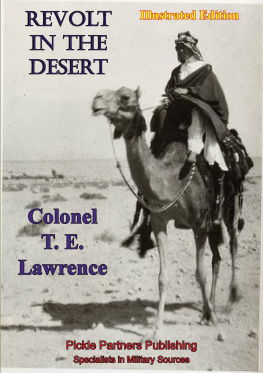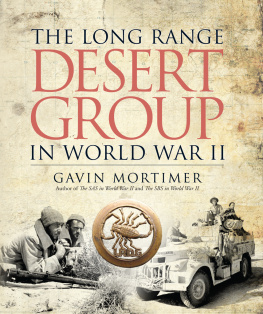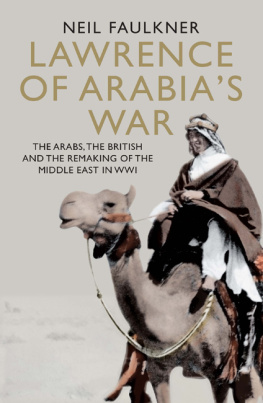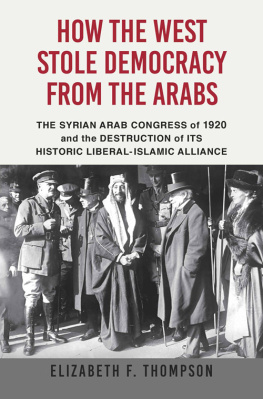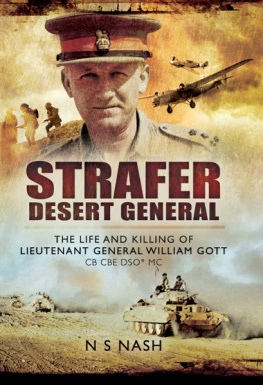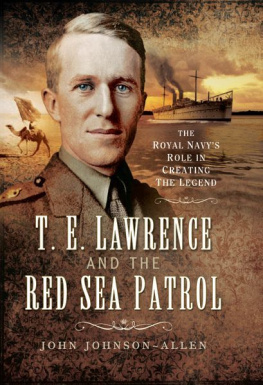

This edition is published by PICKLE PARTNERS PUBLISHING www.picklepartnerspublishing.com
To join our mailing list for new titles or for issues with our books
Or on Facebook
Text originally published in 1927 under the same title.
Pickle Partners Publishing 2013, all rights reserved. No part of this publication may be reproduced, stored in a retrieval system or transmitted by any means, electrical, mechanical or otherwise without the written permission of the copyright holder.
Publishers Note
Although in most cases we have retained the Authors original spelling and grammar to authentically reproduce the work of the Author and the original intent of such material, some additional notes and clarifications have been added for the modern readers benefit.
We have also made every effort to include all maps and illustrations of the original edition the limitations of formatting do not allow of including larger maps, we will upload as many of these maps as possible.

REVOLT IN THE DESERT
By
T. E. LAWRENCE
TABLE OF CONTENTS
Contents
INTRODUCTION
ARABS could be swung on an idea as on a cord; for the unpledged allegiance of their minds made them obedient servants. None of them would escape the bond till success had come, and with it responsibility and duty and engagements. Then the idea was gone and the work endedin ruins. Without a creed they could be taken to the four corners of the world (but not to heaven) by being shown the riches of earth and the pleasures of it; but if on the road, led in this fashion, they met the prophet of an idea, who had nowhere to lay his head and who depended for his food on charity or birds, then they would all leave their wealth for his inspiration. They were incorrigibly children of the idea, feckless and colour-blind, to whom body and spirit were forever and inevitably opposed. Their mind was strange and dark, full of depressions and exaltations, lacking in rule, but with more of ardour and more fertile in belief than any other in the world. They were a people of starts, for whom the abstract was the strongest motive, the process of infinite courage and variety, and the end nothing. They were as unstable as water, and like water would perhaps finally prevail. Since the dawn of life, in successive waves they had been dashing themselves against the coasts of flesh. Each wave was broken, but, like the sea, wore away ever so little of the granite on which it failed, and some day, ages yet, might roll unchecked over the place where the material world had been, and God would move upon the face of those waters. One such wave (and not the least) I raised and rolled before the breath of an idea, till it reached its crest, and toppled over and fell at Damascus. The wash of that wave, thrown back by the resistance of vested things, will provide the matter of the following wave, when in fullness of time the sea shall be raised once more.
***
The strange and still mysterious figure of T. E. Lawrence has become, if not the best known, certainly one of the most famous in all the small gallery of true heroes of the war. An unimpressive, rather studious, young man of twenty-six, he was rejected in the opening days of the war as physically unfit for military service. The authorities who rejected him can be forgiven; for not even Lawrence himself had guessed that he added, to the unusual combination of archologist, philosopher, diplomat and student of military affairs, the genius of a surpassing leader of irregular cavalry. After his failure to enlist, his knowledge of Arabic and the Arabian peoples brought him a commission as a subaltern in the Intelligence Service of the British command at Cairo. For his subsequent single-handed organisation and leadership of the Arab revolt, through two years of bitter and weird adventure, in an atmosphere of incredible romance and under a veil of profound secrecy, the authorities were not to blame. It was his own masterpiece, and it was one of the miracles of the war.
In 1914, T. E. Lawrence was serving as a more or less unnoticed assistant in the British Museums excavation of Carchemish on the Euphrates. Under the appearance of a brilliant and somewhat eccentric student of archology, he concealed a lively initiative, a sympathetic understanding of the country, and a relationship to more than one soldier prominent in British history, includingit is supposed a Sir Robert Lawrence who fought as a crusader under Richard Cur de Lion. Casual travellers found him unobtrusively digging Hittite remains out of the banks of the Euphrates; he left them reassured by his tactfulness with the Arab labourers as to the future of the British Empire. He knew the Near East intimately. His first direct knowledge of the complicated peoples of Arabia had been gained while he was still an undergraduate at Oxford, when he is said to have undertaken, alone and in native dress, a two-year expedition among the tribes behind Syria, in order to gather material for his thesis on the military history of the Crusades. Such experience placed him, obviously, in the direct line of those remarkable British Orientalists like Doughty and Burton who have done so much to enrich British letters. It could hardly have been anticipated that it was preparing him for the very different and more romantic achievements in reckless leadership and masterful strategy which are described in these pages. Lawrence was not the author of the revolt; his was the more difficult, and also more dangerous, task of being its inspiration.
A subaltern officer with no respect for his superiors, with a sensitive and vigorous mind, undisturbed either by military regulations or a desire for glory, and with a scholarly taste in reading, he was clearly an unexpected figure among the soldiery and camp followers at Cairo. Since then he has allowed very little to be known of himself. After his triumph in Syria, the famous guerilla leader (who nevertheless remained an ethnological expert) served in the British peace delegation at Versailles, and was later a member of a special commission on Near Eastern affairs headed by the Colonial Secretary. But an almost passionate dislike of notoriety and a seemingly deliberate eccentricity have continued to conceal his character; and he is now [February, 1927] actually serving as a private soldier in the British Army, while the mists of a gathering legend have cloaked him in the obscurity of an almost mythological hero.
However, in 1919, he wrote out in a 400,000-word book the whole bitter account of his adventure and of his disappointment over the conclusion which the Peace Conference seemed to put to it. He left the book, together with some of his notes and many photographs, in a handbag in the Reading railway station; a few minutes later it had disappeared. There was a flurry of rumour to the effect that it had been stolen by high authorities; subsequently it has seemed more likely that the bag was taken by a casual sneak-thief, but Lawrence at any rate sat down with an heroic effort of memory to rewrite the account. He never intended it, however, for publication. He had it printed on a newspaper press in Oxford, in an edition limited characteristically to eight copies, of which three, in what seems almost an excess of reticence, were afterward destroyed.
Of all the honours that an astonished government tried to force upon him, the war-time rank of Lieutenant-Colonel was the only one which he accepted, and that largely because of the necessity for maintaining his status with the Arabs. The latter called him simply El-Orens, or else by the more picturesque title of Wrecker of Engines. The titles which the newspapers afterwards invented only annoyed him; and not long ago the astonishing discovery was made that he had enlisted under an assumed name in the Royal Air Force, presumably to avoid attention. There was, of course, another wave of notoriety, and it is understood that he is now occupying the even less explicable position of a private in the Tank Corps.
Next page
